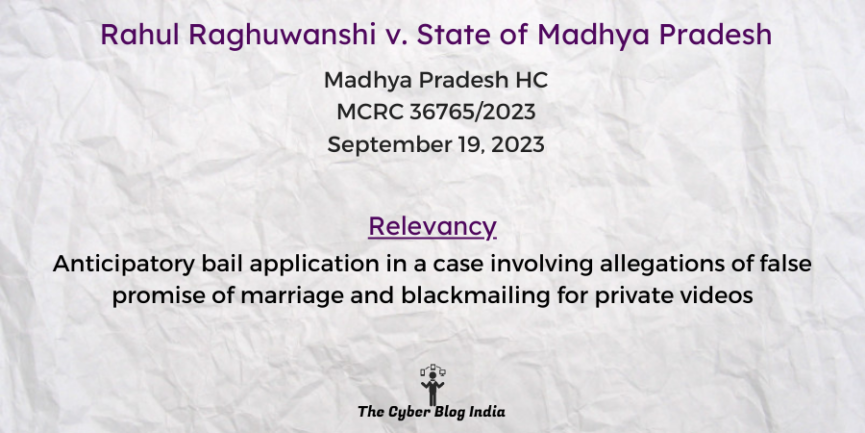Rahul Raghuwanshi v. State of Madhya Pradesh

Rahul Raghuwanshi v. State of Madhya Pradesh
In the High Court of Madhya Pradesh
MCRC 36765/2023
Before Justice Prakash Chandra Gupta
Decided on September 19, 2023
Relevancy of the case: Anticipatory bail application in a case involving allegations of false promise of marriage and blackmailing for private videos
Statutes and Provisions Involved
- The Information Technology Act, 2000 (Section 66, 67)
- The Indian Penal Code, 1860 (Section 294, 323, 506, 384)
Relevant Facts of the Case
- The prosecutrix met the applicant, a police constable, via Facebook while she was living separately due to family issues. This eventually developed into a physical relationship.
- The prosecutrix’s husband filed for divorce in a competent court. The applicant received a transfer in the following year. The applicant and the prosecutrix started living as a married couple. The applicant vowed to marry once the court granted her divorce.
- After a long 4 years of sharing a bed and bread, the applicant married the prosecutrix in an ostentatious ceremony. However, in a few days, the applicant left.
- The applicant had sexual relations with the prosecutrix under the false pretext of marriage, leading to the prosecutrix reporting the same.
Prominent Arguments by the Advocates
- The applicant’s counsel argued that the prosecutrix, an already married woman, couldn’t have been re-married without a divorce. The sexual relationship that the couple shared was completely consensual. The prosecutrix, who had claimed to be Hindu, was found to be of another community, leading to her blackmailing the applicant.
- The respondent’s counsel submitted that when the prosecutrix perceived that the applicant was faking his vow of marriage, she warned him about complaining to the police, which led him to threaten her regarding publishing her private videos online and then kill her.
Opinion of the Bench
- It is a fit case for granting anticipatory bail without any comments on the merits.
Final Decision
- The court allowed the application, thereby granting anticipatory bail to the applicant.
